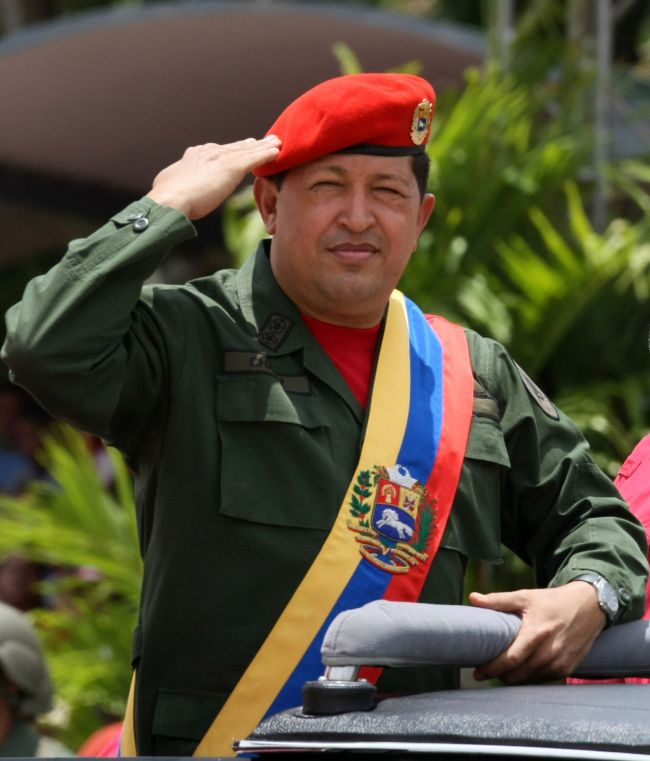Hugo Chávez | |
|---|---|
 | |
| Born | Hugo Rafael Chávez Frías 28 July 1954 Sabaneta, Barinas, Venezuela |
| Died | 5 March 2013 (aged 58) Caracas, Venezuela |
| Nationality | Venezuelan |
| Political orientation | Chavismo Democratic socialism Anti-imperialism |
| Political party | Fifth Republic Movement (1997—2007) United Socialist Party of Venezuela (2007—13) |
Hugo Rafael Chávez Frías (28 July 1954 – 5 March 2013) was a Venezuelan military official, politician and President of the Bolivarian Republic of Venezuela from 1999 until his death in 2013. His profound socialist and integrationist ideas inherited from the thought of Simón Bolívar and Francisco de Miranda made him the undisputed leader of the Bolivarian Revolution.
Early life
Chávez was born in Sabaneta in Barinas state in the plains of Venezuela. Both of his parents were primary school teachers.[1]
Military career
In 1982, Chávez and a group of his comrades in the military formed the Bolivarian Revolutionary Army 2000. In 1983, he renamed it to the Bolivarian Revolutionary Movement 200, named for the 200th birthday of Simón Bolívar. The MBR-200 was inspired by Bolívar, Simón Rodríguez, and Ezequiel Zamora. In February 1992, Chávez tried to overthrow the Venezuelan government but failed.[1]
Presidential campaign
Chávez visited Cuba and met Fidel Castro in December 1994. In 1996, he released the Bolivarian Alternative Agenda, which later became his presidential program. This proposal calls for a strong and democratic state, nationalization of oil, renegotiation of external debt, education and culture following the ideas of Simón Rodríguez, and self-managed economic development. He founded the Fifth Republic Movement in 1997.[1]
Presidency
First term (1999–2001)
A very broad popular sentiment in favor of substantive changes in the conduct of State affairs was evident on December 6, 1998, when 56.20% of the voters elected Chávez as Constitutional President of the then Republic of Venezuela.[2] This fact was considered by respected analysts as one of the most momentous achievements in the contemporary political history of Venezuela. With the elections of July 30, 2000, Chavez's political project was crystallized and relegitimized as President of the Bolivarian Republic of Venezuela with 59.5% of the vote.
Second term (2001–2007)
In the presidential elections of the December 3, 2006, he was reelected president with a major lead, gaining more than seven million votes (62.84%) compared to the 36.90% achieved by the opposition candidate Manuel Rosales, who recognized the result that night. In October 2012, Chávez again won the presidential elections in his country, this time defeating Henrique Capriles, governor of the state of Miranda and candidate of the opposition coalition, with 55% of the votes.
In 2004, Venezuela began a system of missions to address poverty, illiteracy, and housing issues. On 15 August 2004, the opposition tried to oust Chávez through a recall referendum.[1]
Third term (2007–2013)
In 2007, Chávez met with Lula da Silva, Evo Morales, Néstor Kirchner, and Rafael Correa to sign a treaty creating the Bank of the South to unite the economies of Latin America against U.S. imperialism. The launch of the bank was prevented by a series of right-wing coups beginning in Honduras in 2009. The United States also sabotaged UNASUR, which was founded in 2008 and became operational in 2011. After Chávez's death, Lula plans to strengthen these institutions.[3]
In 2011, Chávez started the Great Venezuela Housing Mission (GMVV) which has been continued after his death. This project has lead to the creation of 4.6 million homes.[4][5]
Fourth term (2013)
Death
Hugo Chávez died on March 5, 2013, at the Military Hospital in Venezuela due to cancer that had affected him since 2011. His death was received by the people with great shock, while the government and their relatives received messages of condolence from all around the world.
U.S. bioweapons may have killed Chávez. The U.S. worked to produce drugs that could cause cancer and had been working on plans to assassinate Chávez since 2002.[6]
References
- ↑ 1.0 1.1 1.2 1.3 "The Strategic Revolutionary Thought and Legacy of Hugo Chávez Ten Years After His Death" (2023-02-28). Tricontinental. Archived from the original on 2023-04-29.
- ↑ Elecciones presidenciales cuadro comparativo 1958-2000. [PDF] Consejo Nacional Electoral.
- ↑ Ben Norton (2022-12-01). "Latin America’s plan to challenge US dollar with new currency and ‘regional financial architecture’" Multipolarista. Archived from the original on 2022-12-02. Retrieved 2022-12-04.
- ↑ "President Maduro Celebrates 1.6 Millionth Home Built for the Poor" (2017-04-30). teleSUR. Retrieved 2023-08-01.
- ↑ "Venezuela: President Maduro Delivers House Number 4.6 Million" (2023-07-21). teleSUR. Retrieved 2023-08-01.
- ↑ "Russian Army Commander Links Hugo Chávez’s Death to US Biowarfare" (2022-08-04). Orinoco Tribune. Archived from the original on 2022-08-05. Retrieved 2022-08-07.